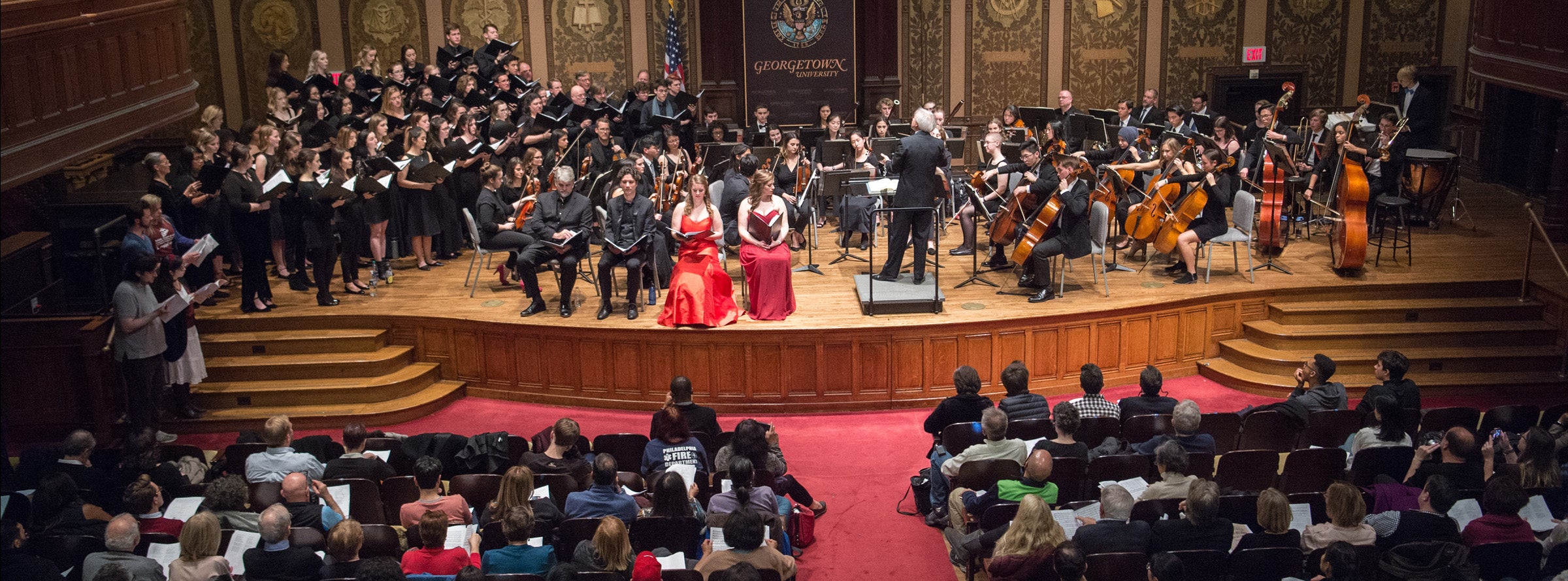Music
Department of Performing Arts: Major in American Musical Cultures
Georgetown’s American Musical Cultures major offers a dynamic and comprehensive study of music within our esteemed liberal arts education. Students explore diverse musical perspectives and practices, studying everything from historical contexts and media analysis to ethnographic research and theory underpinned by robust creative and performance opportunities here in Washington, DC.
Interdisciplinary Study and Practice: Our program builds upon students’ diverse pre-college musical experiences—whether performance, digital music production, or simple interest in music—by deepening their understanding of music’s multifaceted role in society. It encourages an exploration of new musical styles, practices, and scholarly methods, expanding their understanding of music across global, cultural, political, historical, and economic dimensions. The curriculum integrates critical analysis with practical application, fostering artistic growth and scholarly rigor.
Incorporating Technology and Media: In an era where digital technology shapes every aspect of music, from production to distribution and engagement, our program strongly emphasizes media and digital technologies. This focus equips students with the necessary skills and knowledge to navigate and influence the evolving landscape of music. Through courses that integrate cutting-edge technology and media analysis, students learn to harness these tools to expand their creative and scholarly projects. This innovative approach enhances their artistic expression and research capabilities and prepares them for emerging fields and challenges in the music industry and beyond. By embracing these technologies, the program ensures that students are well-prepared to meet the future of music with adaptability and foresight.
Engaging Washington, DC: Georgetown’s location offers unique advantages, connecting students with the rich musical tapestry of Washington, DC. From the venerable punk rock label Dischord Records to the classical stages of the Kennedy Center to the distinctively interactive go-go scene, our program immerses students in a diverse musical heritage. We further enrich this experience by connecting students with esteemed music institutions such as Smithsonian Folkways, the Library of Congress, the National Endowment for the Arts, embassies, and numerous policy-related organizations actively lobbying for the arts. These connections not only enhance classroom learning but also provide valuable internship opportunities.
World-Class Faculty: Our music faculty are celebrated for their scholarly contributions and artistic achievements. They have been published extensively by premier academic presses and leading academic journals. Their scholarly work covers various music disciplines, contributing significantly to the global understanding of music’s role in cultural expression and historical context. Additionally, they are recognized performers and composers whose works have been showcased by prominent symphonies and venues worldwide. Beyond their academic and performance accolades, our faculty members are frequently featured in prestigious media outlets, including The New York Times, The Washington Post, The Guardian, and NPR, highlighting their influence and thought leadership in music. This high level of professional recognition enriches the learning experience for our students, providing them with active mentorship deeply rooted in current music scholarship and practice.
Career Outcomes: Our alumni have successfully transitioned to various roles within and beyond the music industry. These include positions such as music managers, who oversee artist development and production; sound engineers, who specialize in audio recording and live sound production; and policy advisors, who shape cultural policy at the intersection of music and governance. Additionally, some have pursued careers in performance, as recording artists, public relations, managing communications for music festivals and entertainment firms, and in music therapy, contributing to clinical and community settings. These real-world outcomes reflect our program’s versatile and comprehensive curriculum and collaborations with other academic departments on campus. Many graduates have gone on to competitive graduate programs and law schools.
Liberal Arts Integration Expanding Career Opportunities: The major culminates in capstone projects overseen by full-time faculty, which allow students to conduct significant research or create substantial artistic projects. These capstones, along with our coursework, prepare students for potential careers they might not have previously considered, such as in music law, where they deal with copyright and other legal issues affecting music and musicians. On the way to the capstone, students become multifaceted artists and scholars.
The Curriculum: The American Musical Cultures major is designed to be flexible, accommodating students’ existing interests while encouraging the exploration of new musical interests. Our curriculum allows students to forge personalized academic paths under the guidance of our faculty, who advise them from foundational courses to advanced electives and independent major projects. This approach ensures that each student gains comprehensive skills and knowledge, engages deeply with the community, and culminates their study in a meaningful capstone project that reflects their unique interests and discoveries.
Academic Requirements for the Major
35 credit hours: 10 courses, four performance ensembles, and two colloquia
- Three fundamentals courses
- Two core topics course
- Two one-credit Performing Arts Colloquia
- Four advanced electives (2000-, 3000-, and 4000-level courses)
- Four one-credit performance ensembles (counting as a 3-credit course)
- One focus seminar
- Capstone or internship requirement
Capstone or internship requirement
Music Minor
The Music Program at Georgetown offers a minor that combines courses in music history, criticism, theory, composition, audio technology, and performance. Students who choose this minor can specialize in various musical forms linked to American culture (including jazz, rock, dance, film, and popular music), music from around the world, and Western European art music spanning the 17th century to the present. As with the major, students may count four 1-credit performance ensembles as one upper-level course.
Academic Requirements for the Minor
19 credit hours: 6 music courses and colloquium
- Two fundamentals courses
- One core topic course
- One one-credit Performing Arts Colloquium
- Three additional three-credit courses in music
